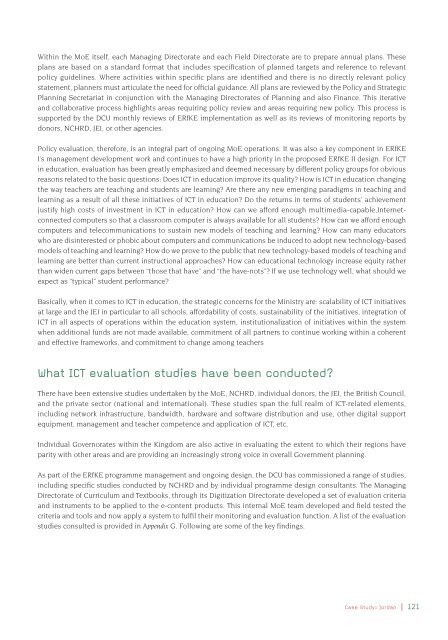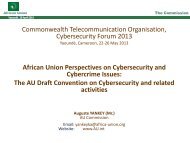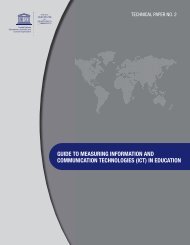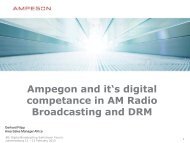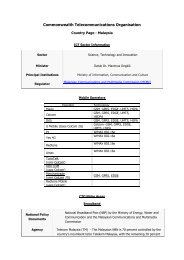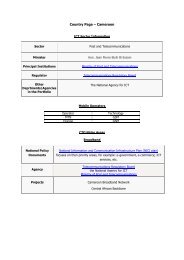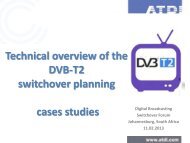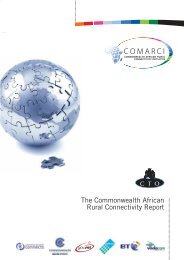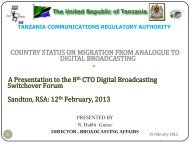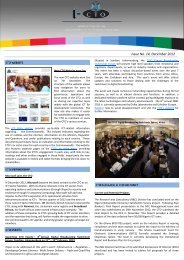Transforming education: the power of ICT policies - Commonwealth ...
Transforming education: the power of ICT policies - Commonwealth ...
Transforming education: the power of ICT policies - Commonwealth ...
You also want an ePaper? Increase the reach of your titles
YUMPU automatically turns print PDFs into web optimized ePapers that Google loves.
Within <strong>the</strong> MoE itself, each Managing Directorate and each Field Directorate are to prepare annual plans. These<br />
plans are based on a standard format that includes specifi cation <strong>of</strong> planned targets and reference to relevant<br />
policy guidelines. Where activities within specifi c plans are identifi ed and <strong>the</strong>re is no directly relevant policy<br />
statement, planners must articulate <strong>the</strong> need for <strong>of</strong>fi cial guidance. All plans are reviewed by <strong>the</strong> Policy and Strategic<br />
Planning Secretariat in conjunction with <strong>the</strong> Managing Directorates <strong>of</strong> Planning and also Finance. This iterative<br />
and collaborative process highlights areas requiring policy review and areas requiring new policy. This process is<br />
supported by <strong>the</strong> DCU monthly reviews <strong>of</strong> ERfKE implementation as well as its reviews <strong>of</strong> monitoring reports by<br />
donors, NCHRD, JEI, or o<strong>the</strong>r agencies.<br />
Policy evaluation, <strong>the</strong>refore, is an integral part <strong>of</strong> ongoing MoE operations. It was also a key component in ERfKE<br />
I’s management development work and continues to have a high priority in <strong>the</strong> proposed ERfKE II design. For <strong>ICT</strong><br />
in <strong>education</strong>, evaluation has been greatly emphasized and deemed necessary by different policy groups for obvious<br />
reasons related to <strong>the</strong> basic questions: Does <strong>ICT</strong> in <strong>education</strong> improve its quality? How is <strong>ICT</strong> in <strong>education</strong> changing<br />
<strong>the</strong> way teachers are teaching and students are learning? Are <strong>the</strong>re any new emerging paradigms in teaching and<br />
learning as a result <strong>of</strong> all <strong>the</strong>se initiatives <strong>of</strong> <strong>ICT</strong> in <strong>education</strong>? Do <strong>the</strong> returns in terms <strong>of</strong> students’ achievement<br />
justify high costs <strong>of</strong> investment in <strong>ICT</strong> in <strong>education</strong>? How can we afford enough multimedia-capable,Internetconnected<br />
computers so that a classroom computer is always available for all students? How can we afford enough<br />
computers and telecommunications to sustain new models <strong>of</strong> teaching and learning? How can many educators<br />
who are disinterested or phobic about computers and communications be induced to adopt new technology-based<br />
models <strong>of</strong> teaching and learning? How do we prove to <strong>the</strong> public that new technology-based models <strong>of</strong> teaching and<br />
learning are better than current instructional approaches? How can <strong>education</strong>al technology increase equity ra<strong>the</strong>r<br />
than widen current gaps between “those that have” and “<strong>the</strong> have-nots”? If we use technology well, what should we<br />
expect as “typical” student performance?<br />
Basically, when it comes to <strong>ICT</strong> in <strong>education</strong>, <strong>the</strong> strategic concerns for <strong>the</strong> Ministry are: scalability <strong>of</strong> <strong>ICT</strong> initiatives<br />
at large and <strong>the</strong> JEI in particular to all schools, affordability <strong>of</strong> costs, sustainability <strong>of</strong> <strong>the</strong> initiatives, integration <strong>of</strong><br />
<strong>ICT</strong> in all aspects <strong>of</strong> operations within <strong>the</strong> <strong>education</strong> system, institutionalization <strong>of</strong> initiatives within <strong>the</strong> system<br />
when additional funds are not made available, commitment <strong>of</strong> all partners to continue working within a coherent<br />
and effective frameworks, and commitment to change among teachers<br />
What <strong>ICT</strong> evaluation studies have been conducted?<br />
There have been extensive studies undertaken by <strong>the</strong> MoE, NCHRD, individual donors, <strong>the</strong> JEI, <strong>the</strong> British Council,<br />
and <strong>the</strong> private sector (national and international). These studies span <strong>the</strong> full realm <strong>of</strong> <strong>ICT</strong>-related elements,<br />
including network infrastructure, bandwidth, hardware and s<strong>of</strong>tware distribution and use, o<strong>the</strong>r digital support<br />
equipment, management and teacher competence and application <strong>of</strong> <strong>ICT</strong>, etc.<br />
Individual Governorates within <strong>the</strong> Kingdom are also active in evaluating <strong>the</strong> extent to which <strong>the</strong>ir regions have<br />
parity with o<strong>the</strong>r areas and are providing an increasingly strong voice in overall Government planning.<br />
As part <strong>of</strong> <strong>the</strong> ERfKE programme management and ongoing design, <strong>the</strong> DCU has commissioned a range <strong>of</strong> studies,<br />
including specifi c studies conducted by NCHRD and by individual programme design consultants. The Managing<br />
Directorate <strong>of</strong> Curriculum and Textbooks, through its Digitization Directorate developed a set <strong>of</strong> evaluation criteria<br />
and instruments to be applied to <strong>the</strong> e-content products. This internal MoE team developed and fi eld tested <strong>the</strong><br />
criteria and tools and now apply a system to fulfi l <strong>the</strong>ir monitoring and evaluation function. A list <strong>of</strong> <strong>the</strong> evaluation<br />
studies consulted is provided in Appendix G. Following are some <strong>of</strong> <strong>the</strong> key fi ndings.<br />
Case Study: Jordan | 121


